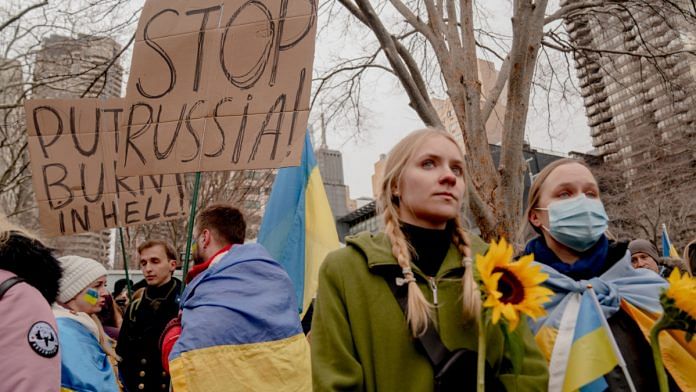As diplomats and national leaders dallied over sanctions against Russia for its invasion of Ukraine, digital defenders got straight to work.
Within a day of tanks crossing the border and missiles striking targets, hacker collective Anonymous declared “cyber war against the Russian government.” Soon after, the amorphous online collective claimed to have taken down the website of Kremlin-backed TV channel RT and that of a Russian ministry. RT’s website was still down the following morning, the Daily Mail reported. Both were operational at the time of writing. Over the weekend, the Kremlin’s official website as well as Russian television stations were apparently hacked as well.
Ukraine’s government has also called for people to take up digital arms against Russia, with the nation’s hacker underground being enlisted in the fight, Reuters reported Friday. The cyber response comes after Ukrainian government, banking and media websites were taken offline in distributed denial of service attacks. This is not unfamiliar territory for the east European nation — it has borne the brunt of Russian cyber aggression for years.
Unprecedented, though, is the prospect that a global collective of digital warriors may rally around Ukraine to help fend off Moscow’s belligerence. With the North Atlantic Treaty Organization, the EU and even the U.S. declining to get involved in the military battle now being waged on Ukraine soil, hackers and digital supporters around the world could become a powerful and visible defender of Ukraine.
Such an offensive could sting President Vladimir Putin far more than he may expect, and have the potential to be far more effective than economic sanctions. While Russian hackers are notoriously good at attacking foreign targets, including the 2020 SolarWinds breach, cyber defense is a lot harder. An offender need only be successful a few times to wreak havoc, but a defender needs to win pretty much all the time. And Russia’s defenses are surely not bullet proof.
The cyber guerrillas for now are fighting fire with fire, knocking important Russian websites offline after Russia did the same to Ukrainian websites, employing a scattershot approach of digital harassment. Hacktivists with Anonymous typically don’t have the same kind of expertise as state-backed cyber forces, who are trained and mobilized to plan incursions on web systems over many months. In contrast, hacktivists are often young and will jump into an online chat room in their spare time to discuss a so-called op, downloading free, do-it-yourself software tools to join with others to, for instance, help take a site offline.
It seems like a sticks and duct-tape exercise but hacktivists have the benefit of scale, particularly when a cause strikes a chord and becomes globally popular. In the past they have managed to cause millions of dollars worth of damage. For instance, when Wikileaks founder Julian Assange was arrested in 2010 and first threatened with extradition, thousands of people coalesced in chat channels as part of “Operation Avenge Assange.” They then followed instructions to download software that would help them attack the websites of large payments providers like PayPal and MasterCard; several participants were later arrested, but most went on with their lives.
Russian digital warfare often aims to sow discord and confusion — think back to Moscow’s disinformation campaign on social media during the 2016 U.S. elections. Anonymous has excelled at creating discord and confusion too, waging cultural battles online by spreading memes and carrying out viral stunts aimed at undermining authority. Having carried out hacks that poked fun at figures from Tom Cruise and the Church of Scientology to Rupert Murdoch, Anonymous’s greatest potential may be in subverting Putin’s standing as an authoritative figure in Russia, a critical issue for the extremely image-conscious leader.
Years of exposure to cyber aggression has also bolstered Ukraine’s resilience, allowing it to get back up and running quickly after the recent incursions. Russia’s digital fortifications may not yet have been fully tested. And should attackers get through, the possibility of bringing down systems that control transport, telecoms, banking, energy and even mining could at the very least disrupt Moscow in the midst of a war, and at worst bring such operations to a halt.
Early signs of what collective action might achieve were seen last month when a Belarusian group called Cyber Partisans targeted state-owned Belarusian Railway in order to disrupt Russian troop movements through the country. There’s already been concerns floated that Russia’s cyber attacks against Ukraine could go global, with the U.S. a likely target.
But the reverse is also true. Cyber warfare could be an effective strategy deployed by national agencies. Rather than put troops on the ground, Washington, through its United States Cyber Command, could get to work trying to knock out power and gas operations, and disrupting communications. Allied governments may choose to acknowledge such action, or deny any involvement.
But with non-government actors like Anonymous, Cyber Partisans and the coalition being built by the Ukraine government also joining the fight, placing blame may not be so easy. And ultimately irrelevant.
Putin started this fight. Perhaps the world’s digital warriors can help end it. –Bloomberg
Also read: Why Indian defence is concerned about Russia-Ukraine crisis — project delivery, lessons China draws



